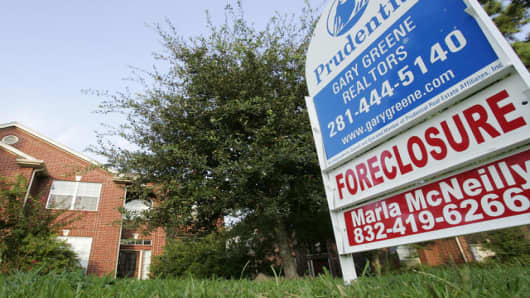The FBI's criminal probe of the mortgage lending industry has grown to 17 firms, involves large companies, and could take years to conclude, bureau officials said on Tuesday in a Reuters interview.
That number is up from the 16 previously acknowledged, the officials said.
"The corporate fraud cases are pretty large entities," said Neil Power, economic crimes unit chief of the Federal Bureau of Investigation's financial crimes section. "The majority I would think we're looking at years."
Power declined to comment when asked if the FBI was looking into the collapse of Bear Stearns, which led to an emergency sale to JPMorgan Chaselast weekend. However, he said, "common sense would indicate that we would look at something that big."
The hundreds of FBI agents taking part in the probe are looking at issues including all phases of the process of securitizing loans, insider trading and whether firms properly disclosed the value of their assets.
Corporate employees ranging from senior executives to lower-level management were under scrutiny, an official said.
The officials described widespread opportunities for fraud in the industry, which can all be traced back to human greed, and to lax documentation in loan applications, which allowed for loans based on false values or income.
"The problem is that banks weren't doing their due diligence," Power said.
The FBI disclosed in January that it was investigating 14 firms in its probe of the mortgage-lending industry, where a foreclosure crisis has spread from subprime lenders to the housing market overall, shaken Wall Street and major financial institutions, and threatened the U.S. economy with recession.
The FBI later raised the number of targets to 16. That has since grown to 17, Power said, but the number changes as investigations open and close. Asked if the number would grow, he said "yes," but declined further characterization and said the probes were in preliminary stages.
Among companies implicated in FBI mortgage probes are Beazer Homes and Doral Financial. A former Doral treasurer was indicted for investment fraud earlier this month. He denied the allegations and the company declined to comment.
The largest U.S. mortgage lender, Countrywide, is also under FBI investigation, authorities have said, although the FBI has has declined to comment and Countrywide said it was unaware of any investigation.
When the FBI disclosed its industry investigation, major investment banks Goldman Sachs, Morgan Stanley and Bear Stearns each said the government had asked them for information, but there was no confirmation of any FBI role and Power declined to comment on individual targets.
MORE THAN 400 AGENTS
The FBI has assigned 100 agents to investigate corporate fraud aspects of the housing crisis, including subprime lending and insider trading. Another 150 are looking at related securities fraud, and 153 are looking at loan originations, officials said.
The investigations are being conducted out of local field offices. The majority of cases are in New York and California, he said.
FBI agents were working in conjunction with the Securities and Exchange Commission and other federal agencies as part of a Justice Department mortgage fraud group, Power said. He said a majority of the FBI corporate cases were referred to the agency by the SEC, and the two agencies were working hand in hand.
The task force has been meeting regularly to compare notes and go over fast-developing trends and threats. "We meet on an ongoing basis once a crisis is happening, which is happening pretty much every week now," Power said.
Decisions on any charges are up to federal prosecutors and not the FBI, but individuals are likely to be prosecuted, Power said.
Deferred Prosecution
The government has been wary of prosecuting an entire company, after accounting firm Arthur Anderson shut down in 2002 as a result of its prosecution in the Enron energy firm collapse.
Asked if this caution would be a factor in the mortgage probe, Power pointed to the Justice Department's guidance which encourages "deferred prosecution agreements," in which companies agree to change their behavior under a monitor's oversight, as an alternative to indictment.
But he said individuals would face prosecution, and FBI spokesman Stephen Kodak said the investigators are targeting "all gamuts" of employees ranging from senior executives to lower level managers.
The opportunities for fraud existed all along the chain from mortgage origination to the investors in mortgage-backed securities. But the problems begin in loan applications that required minimal or no documentation, the officials said.
"That's the start of the fraud right there," said Mike Cuff, a supervisory special agent in the economic crimes unit. The poorly documented loans then made their way through the securitization system, through brokers and appraisers, and into investments and corporate balance sheets.
"We're looking at all phases of the securitization," Power said.
Power said the mortgage crisis demonstrates a need for regulatory reform. But he said the industry's vulnerability to large-scale fraud has been known for years.
In 2004, when house values were soaring and the mortgage industry booming, an FBI criminal division official, Chris Swecker, sounded a prescient warning to Congress: "If fraudulent practices become systemic within the mortgage industry and mortgage fraud is allowed to become unrestrained, it will ultimately place financial institutions at risk and have adverse effects on the stock market," he said.


